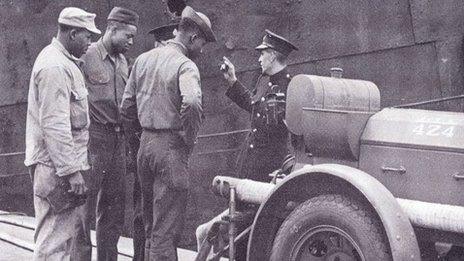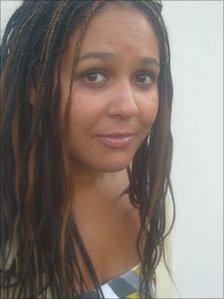Stories of Dorset's WWII's black GIs sought by poet
- Published

The final years of World War II, when thousands of African American GIs were stationed in Dorset, was the first time many British people had seen large numbers of black people living in their communities.
DEED, external, a charity based in Poole, has received a £34,900 grant from the Heritage Lottery Fund (HLF) to explore this period of Dorset history.
The charity is hoping people with memories of or stories from the period will contribute to its study.
Local poet and historian Louisa Parker says it was probably the time when Dorset was "most multi-cultural".
"There were about 80,000 American GIs in Dorset, and about 10% of them were black," she said.
"I think there were probably higher numbers of black faces than there are now."
Ms Parker said the first GIs to arrive would probably have been black Americans.
'Quite attractive'
"The American troops were segregated, and the black Americans did a lot of the menial tasks, so they would have been preparing the camps for the troops."
According to Ms Parker, the black GIs were given a warm welcome by the Dorset locals.
"The local people, as far as we can tell, were fine with the black Americans.

Louisa Parker is hoping to hear people's memories of World War II
"They didn't agree with the segregation, they accepted and welcomed them.
"They mixed with the local white women, who found them quite attractive. Many of them left children."
John Stockley, a chimney sweep, was born in Weymouth the day before World War II ended in 1945.
He was the result of a relationship between a married woman, whose husband was away at war, and a black American serviceman who was billeted at her house, whom he has never been able to trace.
He grew up never understanding why he looked different to other people in Dorset, as his mother kept silent about her affair.
"I wasn't the only one in my area, there were a number of others who were black, but it was tough," he said.
"I wouldn't ask my mum who my dad was, I would just ask why I was different. She said I could be a throwback to a previous generation."
Football ban
Mr Stockley discovered the truth in his 50s, while working for a former friend of his mother's.
Although his relationship with his step-father was difficult growing up, he says he has had a "fantastic life."
"In Somerset and Devon the black children were taken away and they were sent to the colonies, places like Kenya, Nigeria, South Africa, so I'm glad that didn't happen to me," he said.
Standing at 6ft 3ins, and describing himself as "good amateur boxer", as a teenager and adult Mr Stockley was able to defend himself against racism.
However he says he was not allowed to play football for his county or school teams when he was young, due to the colour of his skin.
Mr Stockley also said many mixed race people like himself still did not want to talk about their history.
A veil of secrecy also hangs over the shameful treatment of black soldiers at this time by their white American counterparts
"There were quite a lot of fights between black and white Americans and a few black people were murdered by white soldiers," said Ms Parker.
"At the Rock point in Lyme Regis, a black soldier was stabbed by a white soldier and died, people still remember that."
- Published14 February 2012
- Published13 February 2011